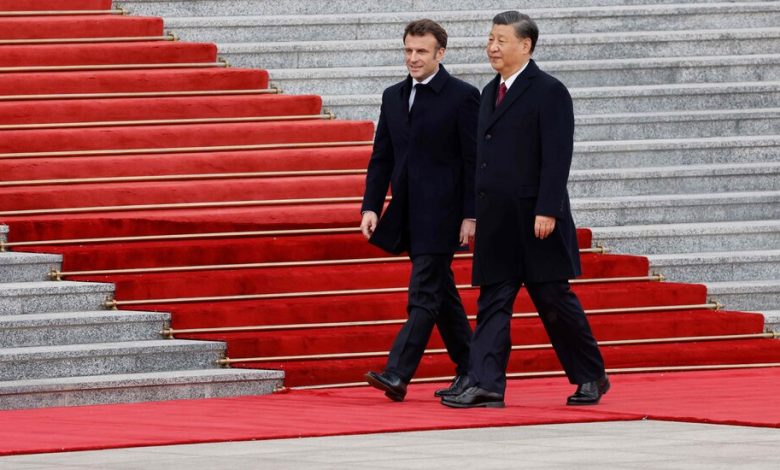Europeans Now See Russia as an Adversary, but Not China

When Chancellor Olaf Scholz of Germany and President Emmanuel Macron of France recently made separate but friendly visits to China, it sparked considerable dismay among their fellow leaders in Europe and Washington.
Especially given Beijing’s “no-limits partnership” with Russia, the efforts to treat China as what Mr. Macron called “a strategic and global partner,” rather than as a rival, were met with sometimes caustic criticism.
Yet, an extensive opinion poll released on Wednesday, shows that Europeanstend to agree with them.
Even as Beijing moves closer to Moscow, and despite the war in Ukraine, a majority of Europeans still see China predominantly as “a necessary partner,” according to the poll of more than 6,000 people in 11 E.U. member states carried out in April by the European Council on Foreign Relations.
The poll indicates that majorities in all 11 countries are unwilling to support the United States against China if there were to be a military escalation between these two powers and would wish to remain neutral.
At the same time, Russia is increasingly seen as an adversary or rival, a view held by some 64 percent of respondents, an increase from about a third of respondents when the same question was posed in a 2021 poll.
“Europeans clearly see the Russia-China alliance and that it’s formed against the West, but they treat them differently,” said Jana Puglierin, co-author of the report accompanying the poll. “That only changes if China supplies arms to Russia.”
Indeed, 41 percent of Europeans would support economic sanctions against China if Beijing were to provide significant military aid to Russia in its invasion of Ukraine, while 33 percent would oppose that step.
The poll has a margin of error of plus or minus two percentage points in larger countries and plus or minus three percentage points in smaller ones.
While wishing to cooperate with Beijing on global issues like climate change, European leaders officially consider China a “systemic rival” and “economic competitor,” according to their “strategic compass,” the European Union’s strategy paper.
Ursula von der Leyen, president of the European Commission, in a speech in late March, took a tough line on Beijing, saying that it was entering a new era of “security and control,” had a policy of “divide and conquer” and that Europe must “de-risk” key sectors from dependence on China.
Her views are closer to those of the Biden administration, but European opinion is closer to the views of Mr. Macron, Ms. Puglierin said.
Yet Mr. Macron was widely criticized for his comments after visiting China’s president Xi Jinping in April, when he said that Europe should not be “followers” on Taiwan or “adapt ourselves to an American rhythm and a Chinese overreaction.”
He said that it would be “a trap for Europe” to get caught up in crises “that are not ours.” Europeans should continue to develop their own strategic autonomy and become a “third pole” in the world order, and not risk becoming “vassals” in a U.S.-China confrontation. Like Mr. Scholz, Mr. Macron downplayed any rivalry and said that China was “a strategic and global partner.”
Still, while France and Germany are the main partners for Beijing, “the reality is that French businesses are disillusioned with the Chinese market, and the long-term picture for Sino-French economic partnership looks gloomy at best,” cautioned Philippe Le Corre, a scholar of China with the Asia Society Policy Institute’s Center for China Analysis.
For him, the most important finding of the survey is that French and German respondents have fairly negative views of China, with only 31 percent of the French and 33 percent of Germans seeing China as a “partner,” while 50 percent of Germans and 41 percent of the French see China as a rival or an adversary.
That would seem to leave both leaders, even if more in tune with European sentiments, on more challenging ground at home, but perhaps making it easier for Germany in particular to reduce its significant economy dependency on trade with China, especially in the key automotive sector.
Elsewhere, Mr. Le Corre said, Europeans were either “largely apathetic” about China or wary, especially of Chinese investment in European infrastructure, tech companies and the media. “Europeans do not want an increase in Chinese foreign direct investments — so much for the Belt and Road Initiative,” Mr. Le Corre said, referring to China’s push to build ports, rail lines and telecommunications networks around the world.
Views on Russia have hardened, with majorities seeing Russia as an adversary, with growing doubts about Moscow even in traditionally sympathetic France and Italy, pointed out Pawel Zerka, a co-author of the report.
Roughly half of all respondents believe that even after a peace in Ukraine, future relations with Russia should be “limited.” But in Bulgaria and Hungary a majority of respondents viewed Russia as an “ally” or “partner” and in general would like to cooperate with Moscow after the war.
While views of the United States as an ally have improved from 2021, when Donald J. Trump was president, roughly three-quarters of respondents believe that Europe should reduce its security dependence on Washington and invest more in its own defense. Some 56 percent of all respondents said that the re-election of Mr. Trump would weaken trans-Atlantic relations.
In general, Ms. Puglierin said, “Europeans are ready to praise the trans-Atlantic relationship and see more benefits than risks, but don’t see that it comes with obligations. They don’t see that Taiwan is considered a fundamental part of U.S. strategy or that it is linked with Ukraine,” or to the protection of the Pacific sea lanes on which European trade depends.
“There is little awareness that it would be problematic not to side with the U.S. after it has invested so much in Europe,” she said. “They see neutrality as an option.”
